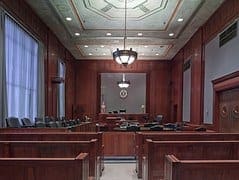 A judicial tax foreclosure may extinguish an out of home lease but can’t extinguish an out of home easement. That’s the lesson of OUTFRONT Media vs CHHC, Inc. and Five Star Outdoor, LLC. Here are the facts.
A judicial tax foreclosure may extinguish an out of home lease but can’t extinguish an out of home easement. That’s the lesson of OUTFRONT Media vs CHHC, Inc. and Five Star Outdoor, LLC. Here are the facts.
- Eastside Outdoor, LLC. (“Eastside”) entered into a lease agreement with CBS Outdoor to permit the erection of a billboard at 15323 W. 8 Mile Rd.in Detroit (“the Property”) in 2007. After signing the lease, Eastside entered into a perpetual easement agreement with JJ, LLC. The easement provided that the right “to exclusively construct install repair replace operate utilize lease and/or maintain there on a billboard sign structure, a pertinences and ancillary equipment. The easement was recorded in 2007. The easement was eventually assigned to Five Star Outdoor LLC. (“Five Star”).
- OUTFRONT Media, LLC. (“OUTFRONT”) became successor to CBS Outdoor in the lease.
- The Property was sold in multiple times. In 2021 Wayne County foreclosed on the Property for nonpayment of property taxes. The Wayne county treasurer took title to the Property on April 1, 2021 and sold the Property at auction to CHHC, Inc. (“CHHC”) in October 2021
- In 2021 CHHC notified OUTFRONT that it was owner of the Property and OUTFRONT should pay lease payments to CHHC. OUTFRONT refused contending that Five Star held the easement for the Property and therefore was the lesser under the lease.
- CHHC filed complaints against OUTFRONT and Five Star, arguing that lease and easement were extinguished by the tax foreclosure.
- In March 2025 a State of Michigan Court of Appeals found that the easement was not extinguished by the tax foreclosure. The Court of Appeals quoted Michigan law which says that in a tax foreclosure “all existing recorded and unrecorded interests in that property are extinguished, except a visible or recorded easement or right of way…” In the Court’s words, “The parties do not dispute that Five Star’s easement is recorded. The trial court determined because Five Star’s easement was recorded. It was not extinguished by tax foreclosure… The trial court did not err by determining that Five Star’s easement was not extinguished by the tax foreclosure.”
- The Court of Appeals held OUTFRONT’s billboard lease was extinguished for the tax foreclosure because the state’s statutue provides that a judicial tax foreclosure extinguishes “all existing recorded and unrecorded interests in that property.”
Billboard Insider’s take: Not sure how much difference this case makes to OUTFRONT and Five Star. The easement was upheld so what stops Five Star from signing a new lease with OUTFRONT identical to the old lease and everything carries on just the same? What do you attorneys think? Use the comment box below or email davewestburg@billboardinsider.com and we’ll run a followup post.
This case also illustrates how important it is to keep track of the real estate on which you have a billboard. Unpaid taxes could result in a tax foreclosure which extinguishes your billboard lease.
To receive a free morning newsletter with each day’s Billboard insider articles email info@billboardinsider.com with the word “Subscribe” in the title. Our newsletter is free and we don’t sell our subscriber list.
Paid Advertisement


















Interesting case….
As a real estate appraiser I see two aspects to this situation.
1.. There is an “easement in gross” for the sign location easement which is almost like owning that described location in fee. The property can be sold yet the “easement in gross” stays with it’s owner typically.
2.. any access easement across the property is an easement appurtenant.
How the two types of easement relate to the tax foreclosure is an interesting matter of law.
California has a similar statute, Revenue and Tax Code, Sec. 3712, ” The deed conveys title to the purchaser free of all encumbrances of any kind existing before the sale, except:
“(d) Easements of any kind, including prescriptive, constituting servitudes upon or burdens to the property; water rights, the record title to which is held separately from the title to the property; and restrictions of record… .”
The Michigan court separated the lease (Eastside to Outfront) from the easement (now owned by Five Star). the easement survived, but the lease did not. Five Star and Outfront can indeed enter into a new lease, but Five Star may want to change the terms. Can it do so?
Missing from the story, and the decision, is the relationship between Five Star and Outfront. It looks like Outfront was paying rent to Five Star, apparently on the same terms as the original lease from Eastside. Is there a written agreement between Outfront and Five Star? Is there an oral agreement? Is there an implied agreement based on eighteen years of rental payments? Did Eastside assign its interest as lessor to JJ, LLC? Did JJ, LLC then assign its interest as lessor to Five Star?
We found the case and a good summary of it (in about one minute, using AI … see my article published in Billboard Insider on 5/27). Here are some additional points that help to make sense of the decision.
*Eastside leased the Property to Outfront and entered into a perpetual easement agreement with JJ LLC the next day.
*Eastside and JJ LLC are affiliated. The same person signed the Easement Agreement on behalf of both entities.
*CHHC asked the court to cancel the easement, but court refused to do that.
*Although the lease and the easement overlap, Outfront did not challenge the easement. CHHC had no right to do so.
*Even if Eastside and then JJ LLC assigned the lease to Five Star along with the easement, the lease was extinguished by the tax sale.
*Outfront and Five Star both asserted that the easement survived the tax sale. In this case, they did not express any disagreement between themselves.
Conclusion: The owner of Eastside wanted to be able to sell the property while retaining the right to lease it for billboard purposes. He apparently created JJ LLC to hold the rights to lease the property to an out-of-home company. If Eastside had first created the easement and then used JJ LLC to lease the easement to Outfront, CHHC would not have had any standing to challenge the lease.
It is not clear how the court would have ruled if JJ LLC and Five Star had expressly assumed the lease obligations. Regardless, it would be difficult for Five Star to assert it no longer had to honor the obligations it had assumed.
If Outfront and Five Star are happy with the existing lease terms, they should sign something that says so. It can be as simple as a single page binding adopting the terms of the foreclosed lease. As it stands, Five Star might be in a position to force renegotiation of the lease terms (which will depend on its relationship with Outfront).
Lessons: Out-of-Home companies can protect themselves with due diligence.
*Verify title of the lessor.
*When you know the owner intends to carve out an easement, or has done so, the lessor should be the easement holder.
*The easement should be recorded!
*When a new owner asks for rent, ask them to provide a copy of the assignment of the lease and assumption of the lessor’s obligations under the lease.
*If the new lessor is an easement holder, the assumption of the lessor’s obligations should expressly apply to the easement.